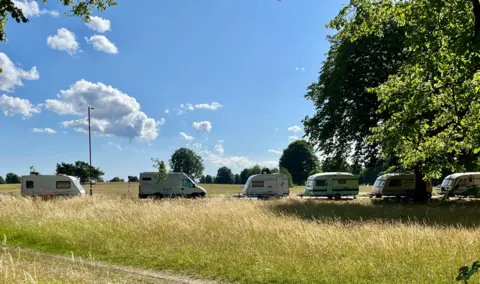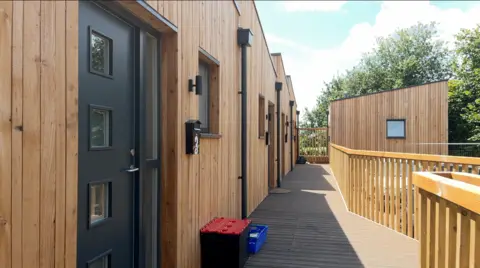Clifton Down vans 'not acceptable,' says MP
 BBC
BBCThe Bristol MP representing people living around Clifton Down has said the situation with caravans and vehicles in the area is "not acceptable for anyone involved".
Darren Jones, Labour MP for Bristol North West, met city council leader Tony Dyer, of the Green Party, at city hall as he called on the local authority to act.
He told the BBC the meeting had been "reassuring", but that he felt the current timescales for dealing with the issue "feel a bit slow".
The council, which is no overall control, says it has begun meetings with those affected, as it seeks to develop a new policy supporting both people living in vans and the surrounding communities. It says this is "not a process we can rush".
In recent months, tensions have been rising on the Downs, where more than 100 vehicles are inhabited.
"This situation has rumbled on too long, the council should have acted sooner," Jones said.
"I've been reassured today that they have a plan in place that's coming forward after the summer and I expect action to be taken quickly after that."
One of his requests is for Bristol City Council to collect data from people living in vans on the Downs, in order to better understand their motivations and work out how best to offer support.
The campaign group Protect the Downs has repeatedly criticised the local authority for not holding this information.
Council sources suggest it can be challenging to monitor, as some of the population is transient while others may be reluctant to engage.

Jones is also asking the council to create more appropriate temporary accommodation sites, similar to the modular homes recently created in Fishponds for people who are homeless.
Places for People, which runs the scheme, is seeking to expand across the city, and said their units could go from design to completion within a year if they had the necessary land.
James Brown, of the social enterprise, said Bristol City Council had been "very supportive" of its work, as it sought to set up small developments with 10-15 units around the city.
"This could be done all over Bristol. We are looking at what land is available, and what we can do to procure that land. Obviously that is difficult."
Increase since pandemic
Across the whole of Bristol, the city council estimates there are about 650 lived-in vehicles, up from about 150 before the pandemic.
The vast majority of the increase happened during the tenure of Labour mayor Marvin Rees, before he left the post in 2024 and it was abolished.
Asked whether Labour should take some responsibility for the rise in numbers, Jones pointed to a report published by the city council in February 2024, which made several recommendations.
"This became a really big issue towards the back-end of the last Labour [mayoral] administration," Jones said. "Action was not taken off the back of that report and that's what we're pushing for."
The council says it is taking a "proactive stance on addressing the issues that have been allowed to get progressively worse over the last several years".
The issue is due to be discussed at a meeting of Bristol City Council on Tuesday, after more than 4,000 Bristol residents signed a petition calling for the authority to stop people living in and around the area.
